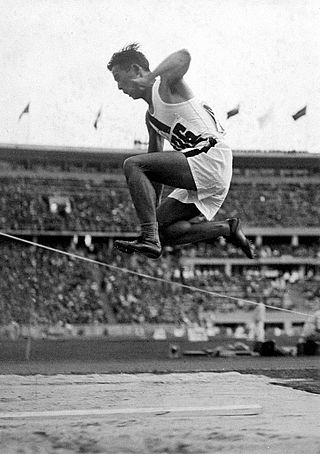
The long jump is a track and field event in which athletes combine speed, strength and agility in an attempt to leap as far as possible from a takeoff point. Along with the triple jump, the two events that measure jumping for distance as a group are referred to as the "horizontal jumps". This event has a history in the ancient Olympic Games and has been a modern Olympic event for men since the first Olympics in 1896 and for women since 1948.

Frederick Carlton Lewis is an American former track and field athlete who won nine Olympic gold medals, one Olympic silver medal, and 10 World Championships medals, including eight gold. Lewis was a dominant sprinter and long jumper whose career spanned from 1979 to 1996, when he last won the Olympic long jump. He is one of six athletes to win gold in the same individual event in four consecutive Olympic Games, and is one of two people to win gold in the same individual athletics event in four Olympic Games, along with USA discus thrower Al Oerter. He is the head track and field coach for the University of Houston.
The men's long jump competition at the 2004 Summer Olympics in Athens was held at the Olympic Stadium on 24–26 August. Forty athletes from 30 nations competed. The event was won by Dwight Phillips of the United States, the nation's 21st gold medal in the men's long jump.

Iván Lázaro Pedroso Soler is a retired Cuban track and field athlete, who specialized in the long jump, and the current coach of Nelson Évora, Yulimar Rojas, Ana Peleteiro and Jordan Díaz.

The men's long jump was one of four men's jumping events on the Athletics at the 1964 Summer Olympics program in Tokyo. It was held on 18 October 1964. 37 athletes from 23 nations entered, with 5 not starting in the qualification round. The maximum number of athletes per nation had been set at 3 since the 1930 Olympic Congress. The event was won by 4cm by Lynn Davies of Great Britain, breaking a string of eight straight American victories. It was Great Britain's first gold medal in the men's long jump, and first medal since 1900. It was only the second time the United States had not won the event, with Sweden's William Petersson in 1920 the only non-American to win before Davies. Ralph Boston of the United States and Igor Ter-Ovanesyan of the Soviet Union became the third and fourth men to win a second medal in the long jump.

The men's long jump at the 1988 Summer Olympics in Seoul, South Korea had a start list of 41 competitors from 31 nations, with two qualifying groups before the final (12) took place on Sunday September 25, 1988. The maximum number of athletes per nation had been set at three since the 1930 Olympic Congress.

The men's long jump was an event at the 1956 Summer Olympics in Melbourne, Australia. The qualifying stage and the final both were held on the second day of the track and field competition, on Saturday November 24, 1956. Thirty-two athletes from 21 nations competed. The maximum number of athletes per nation had been set at 3 since the 1930 Olympic Congress. The event was won by 15cm by Greg Bell of the United States, the nation's seventh consecutive and 12th overall victory in the event. Jorma Valkama's bronze medal was Finland's first medal in the men's long jump.
These are the official results of the Men's Long Jump event at the 1991 IAAF World Championships in Tokyo, Japan. There were a total number of 43 participating athletes, with two qualifying groups and the final held on Friday August 30, 1991. The winning margin was 4 cm.
The men's long jump was an event at the 1992 Summer Olympics in Barcelona, Spain. There were 50 participating athletes from 37 nations, with two qualifying groups. The maximum number of athletes per nation had been set at three since the 1930 Olympic Congress. The event was won by 3 cm by Carl Lewis of the United States, the nation's third consecutive and 19th overall gold medal in the men's long jump. Lewis became the second man to win three medals in the event and the first to win three golds. His winning margin of 3 cm would prove to be his narrowest of his four Olympic titles. Mike Powell repeated his silver medal performance from 1988, becoming the eighth two-medal winner in the event. Joe Greene took bronze, completing the United States' second consecutive and fourth overall medal sweep in the men's long jump.

The men's long jump was an event at the 1984 Summer Olympics in Los Angeles, California, United States. There were 31 participating athletes from 25 nations, with two qualifying groups, and the final held on August 6, 1984. The maximum number of athletes per nation had been set at 3 since the 1930 Olympic Congress. The event was won by 30 cm by Carl Lewis of the United States, the nation's 17th gold medal in the event. It was Lewis's second gold of the Games as he tried (successfully) to match Jesse Owens's 1936 quadruple. It was also the first of Lewis's four consecutive gold medals in the long jump and would prove to be his greatest winning margin for the Olympic long jump. Gary Honey gave Australia its first men's long jump medal since 1948; Giovanni Evangelisti won Italy's first-ever medal in the event.

The men's long jump at the 2008 Olympic Games took place on 16 and 18 August at the Beijing Olympic Stadium. Thirty-eight athletes from 32 nations competed. The event was won by Irving Saladino of Panama, the nation's first Olympic gold medal in any event and its first medal the men's long jump. South Africa also won its first men's long jump medal, with Khotso Mokoena's silver. Ibrahim Camejo's bronze was Cuba's first medal in the event since 2000. This event marked the first time that an American did not classify to the final phase in a non-boycotted Olympic competition.
The men's long jump event at the 2000 Summer Olympics took place on Monday, 25 September, and Thursday, 28 September 2000, in Sydney, Australia. Fifty-three athletes from 38 nations competed. The maximum number of athletes per nation had been set at 3 since the 1930 Olympic Congress. The event was won by Iván Pedroso of Cuba, the nation's first medal and title in the men's long jump; it snapped a four-Games streak of American victories. Jai Taurima took silver, Australia's third silver in the event. Roman Shchurenko earned Ukraine's first medal in the men's long jump with his bronze. It was the first time the United States had competed in the event and not won at least a silver medal; the Americans had previously failed to place in the top two only at the boycotted 1980 Games.

The men's long jump was one of four men's jumping events on the Athletics at the 1968 Summer Olympics program in Mexico City. The long jump took place on 18 October 1968. Thirty-five athletes from 22 nations competed. The maximum number of athletes per nation had been set at three since the 1930 Olympic Congress.

The men's long jump at the 1980 Summer Olympics in Moscow, Russian SFSR, Soviet Union had a start list of 32 competitors from 23 countries, with two qualifying groups before the final (12) took place on Monday July 28, 1980. The maximum number of athletes per nation had been set at 3 since the 1930 Olympic Congress. The top twelve and ties and all those reaching 7.90 metres advanced to the final. The event was won by 33cm by Lutz Dombrowski of East Germany, the first gold medal in the men's long jump by any German jumper. Frank Paschek made East Germany the only nation other than the United States to have two men on the podium in the same Games in the event. Valeriy Podluzhniy won the Soviet Union's first men's long jump medal since 1964. The American-led boycott ended the United States' three-Games gold medal streak and 18-Games streak of winning at least a silver medal in the event.

The men's long jump event was part of the track and field athletics programme at the 1928 Summer Olympics. The competition was held on Tuesday, July 31, 1928. Forty-one long jumpers from 23 nations competed. The maximum number of athletes per nation was 4. The event was won by Ed Hamm of the United States, the nation's second consecutive and seventh overall victory in the event. Silvio Cator earned Haiti's first medal in the event by taking silver.

The men's triple jump event was part of the track and field athletics programme at the 1936 Summer Olympics. The competition was held on August 6, 1936. Thirty-one athletes from 19 nations competed. The maximum number of athletes per nation had been set at 3 since the 1930 Olympic Congress. The final was won by Naoto Tajima of Japan with a world-record jump. It was Japan's third consecutive gold medal in the men's triple jump; as of the 2016 Games, it is the last gold medal Japan has won in the event. Masao Harada's silver medal made it the second Games in which Japan put two men on the podium in the event. Jack Metcalfe of Australia earned bronze, Australia's first medal in the event since 1924.

The men's long jump field event at the 1960 Olympic Games took place on September 2. Forty-nine athletes from 34 nations competed. The maximum number of athletes per nation had been set at 3 since the 1930 Olympic Congress. The event was won by 1cm by Ralph Boston of the United States, the nation's eighth consecutive and 13th overall victory in the men's long jump. Igor Ter-Ovanesyan's bronze was the Soviet Union's first medal in the event.

The men's triple jump event at the 1976 Summer Olympics in Montreal, Quebec, Canada, had an entry list of 25 competitors, with two qualifying groups before the final (12) took place on Friday July 30, 1976. The top twelve and ties, and all those reaching 16.30 metres advanced to the final. The qualification round was held in Thursday July 29, 1976. The maximum number of athletes per nation had been set at 3 since the 1930 Olympic Congress.

The men's long jump event at the 1972 Summer Olympics in Munich was held on 8 & 9 of September. Thirty-six athletes from 25 nations competed. The maximum number of athletes per nation had been set at 3 since the 1930 Olympic Congress. The event was won by 6cm by Randy Williams of the United States, the nation's second consecutive and 15th overall gold medal in the men's long jump. Hans Baumgartner earned West Germany's first medal in the event.

The men's long jump at the 1952 Olympic Games took place on July 21 at the Helsinki Olympic Stadium. Twenty-seven athletes from 19 nations competed. The maximum number of athletes per nation had been set at 3 since the 1930 Olympic Congress. American athlete Jerome Biffle won the gold medal by 4cm. It was the United States' sixth consecutive and 11th overall victory in the men's long jump. Hungary earned its first long jump medal with Ödön Földessy's bronze.

















